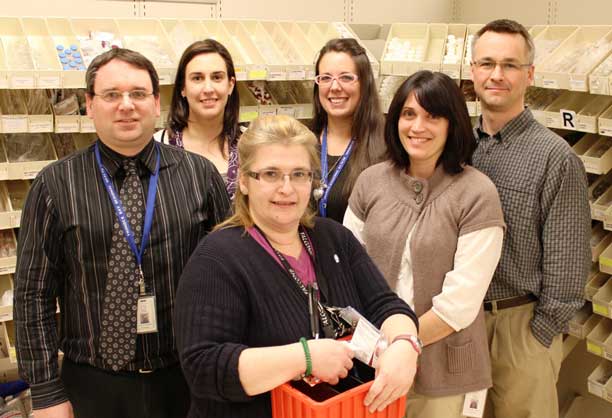

THUNDER BAY – Health – Pharmacists are much more than drug dispensers in bright white coats. Helping people understand the expansive scope of healthcare that pharmacists provide is such a priority for the Canadian Pharmacists’ Association that, this year, for the first time, they are expanding Pharmacist Awareness Week to the entire month of March.
Pharmacists medical and healthcare helpers
Pharmacists are medication experts and so much more. Pharmacists at Thunder Bay Regional Health Sciences (TBRHSC) are involved with every patient and every department of the hospital.
Medication distribution is mainly performed by pharmacy technicians. In addition to the familiar tablets and capsules, these medications also include chemotherapy and intravenous products to all inpatients. Pharmacy technicians are very important to the process because they allow pharmacists to become more involved with medication use issues.
Pharmacists are involved in Medication Reconciliation, identifying medications that patients are taking and how they’re taking it. Medication Reconciliation is a demanding task that requires obtaining information from drugstores, caregivers, family members, and, of course, the patient – to resolve discrepancies and ensure medications ordered in hospital are correct.
“We rely on patients, family members, and other sources to piece together all the prescribed medications. Some can be forgotten or missed. The key to this is creating a Best Possible Medication History or BPMH,” said Jeff Chan, Pharmacy Department Manager. “If we get it done correctly upon admission, there will be fewer errors and the patient won’t be continually asked about their medication history.”
Medication Reconciliation is vital to patient care in all departments, including the Emergency Department. TBRHSC is one of the few hospitals in Canada with an ED pharmacist. “The ED pharmacist is important because so many patients are admitted to the ED because of drug-related problems and many of those were preventable.”
Pharmacists also act as educators and medication consultants to physicians and nursing staff and monitor and dose certain drugs in hospital in order to ensure their effectiveness and limit toxicity.
“Our pharmacists provide in-service education, and informal education to other healthcare team members, residents, and students,” says Chan. “There are many opportunities to educate others about the efficacy and toxicity of pharmacotherapy and medication safety.
TBRHSC Largest Pharmacy in city
TBRHSC’s 24 pharmacy technicians and 14 pharmacists operate the largest pharmacy in the city.
“A lot of people do not realize the role of pharmacists in the hospital,” says Larry Bertoldo, Clinical Practice Lead, ICU and Maternal/Child Pharmacist.
“A lot of our work is behind the scenes, but pharmacists make a difference in patient care and the quality of medication care. We ensure patients are not exposed to inappropriate medications or harmful drug interactions. We have the same goal as the rest of the healthcare team. Our focus is the patient and providing medication management that is 100 per cent appropriate for the patient.”






